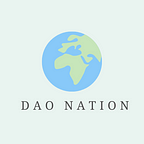Putting the “Human’’ back in Human Capital
The inception of DAO Nation came from a desire to create a sustainable, long-term ecosystem of social impact. It may be considered as the first charity-focused DAO, one that is revolving around a reserve currency inspired by Olympus DAO, while also funneling in further proceeds from synergized dApps, like the NFT marketplace with novel features that we are currently finalizing.
But something still felt missing with the model, until an advisor pointed towards a great governance mining article by Jacob Phillips, and from that point onwards — the answer was clear. Drastic changes had to be made.
Decentralize everything
Our core team is incredible. Great dedication, great minds. But when a “team” leads alone, a risk of stagnation exists. Ideas are circling within an echo chamber, implementation is behind closed doors, and by a limited number of hands.
Not all is bad, but we decided to take a different path, an experimental one, on the way to a whole new governance model that will reward its community members with tokens based on their potency within the ecosystem. The more you contribute, the more you earn, the more impact you have on future proposals.
Call it social capitalism, or capital socialism. It doesn’t matter. What matters is — a community that designs its faith. Not strictly by voting, but by activism from within.
We are currently implementing a governance infrastructure that revolved around 3 main pillars:
- Small Working Groups & Oversight Committees
- Aggressive community incentivization
- Inclusion
DAOs attract various types of members into their communities. Some come for airdrops, others to invest, and then there are the ones that come to act. There’s so much talent that isn’t being utilized nor compensated enough to drive sustainable growth. We all come from different professions and backgrounds, and we all can contribute to making better protocols, better decisions.
This is where the committees come into play — we are now assembling various independent, community-led committees that will be responsible for creating rules and KPIs based on their field of expertise.
The committees will handle support, coordination, synergies, and policy collisions between different working groups. These committees will also be in charge with communicating any relevant information to the main DAO.
For example, there’s the R&D Committee that will include independent backend and frontend programmers and UI/UX designers. This committee will be in charge of navigating development proposals, tracking different community-led tools, arranging hackathons etc.
Currently, we’re looking into the following committees, to begin with:
- R&D
- Marketing and Partnerships
- Charity
- Policy & Transparency
- NFT
The skill level of the individual is not looked upon when a contribution is made to the DAO, but what matters is the results of the effort put in. This is a collaborative system where any effort put in it, that results in the maintenance or improvement of DAO Nation, will be compensated (and compensated well!) for their contribution.
This is a new method of collaboration for an organizational-type project and one that would be as fair and as transparent as possible because the work is visible and monitored by everyone within the DAO.
This allows members and non-members alike a chance to offer constructive criticism which ultimately puts out better products for the long term.
How do we achieve this?
As we continue on with the development of DAO Nation, we are looking for and accepting members who’ll join committees and oversee the growth of the DAO.
Each different working group that comes into existence as the need arises for it will have its own set of token funds that will be set for them, based on the main DAO’s voting. The more value a working group brings to the table, the more impactful value an individual gives to the DAO, the bigger the compensation of tokens they’ll receive.
Governance Mining? Working Groups? Will this work?
The governance mining system just makes sense. A centralized organization is effective and efficient if operated correctly, but suffers from the cons like corruption, censorship, or coercion, A decentralized organization, on the other hand, may face difficulties with growth, progress, and improvements in the long-run, because of management difficulties and lack of long-term incentives for retaining talent and contribution commitments.
That’s where the implementation of sub-DAOs within the main DAO, combined with proper high incentives, eliminates these issues that traditional DAOs are facing.
This is somewhat of an experimental way of managing a DAO, one that will both increase decentralization of its governance, as well as increase its growth from all angles and hastily solve any potential issues that may arise, with its governance handled by individuals and groups that actually put effort and sense into building it throughout its life cycle, rather than people who just bought into voting.
We look for building with you all! Feedback will be appreciated, The whitelist will be open in a few days on our Discord, so stay tuned DAOnators!
Discord: discord.gg/daonation
